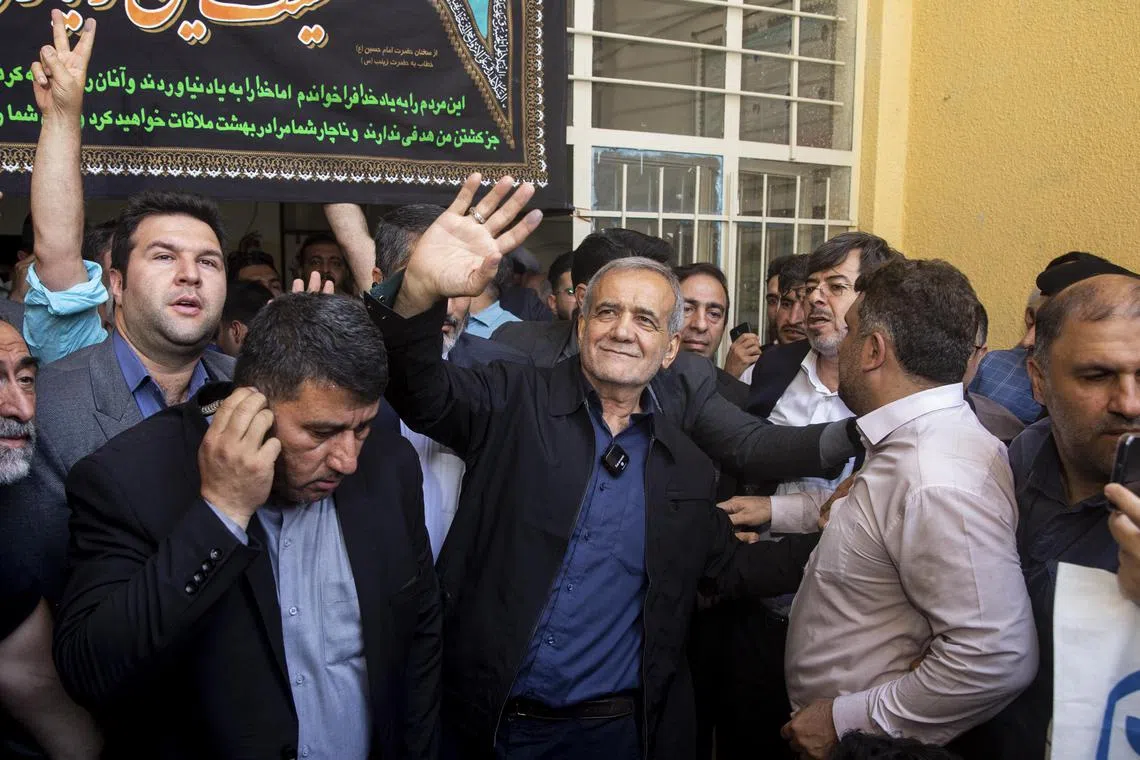Reformist Pezeshkian, who favours better ties with the West, wins Iran presidency
Sign up now: Get ST's newsletters delivered to your inbox

Mr Masoud Pezeshkian, the reformist presidential candidate, after casting his vote in Iran's presidential run-off election at a mosque in Tehran on July 5.
PHOTO: NYTIMES
TEHRAN – Iran’s reformist candidate Masoud Pezeshkian, who advocates improved ties with the West, on July 6 won a run-off presidential election against ultra-conservative Saeed Jalili, the Interior Ministry said.
The election came against a backdrop of heightened regional tensions due to the Gaza war, a dispute with the West over Iran’s nuclear programme, and domestic discontent over the state of Iran’s sanctions-hit economy.
Mr Pezeshkian received more than 16 million votes – or around 54 per cent – and Mr Jalili over 13 million – roughly 44 per cent – of about 30 million votes cast, electoral authority spokesman Mohsen Eslami said.
Voter turnout was 49.8 per cent, Mr Eslami added, up from a record low of about 40 per cent during the first round.
In his first comments after winning, Mr Pezeshkian said the vote was the start of a “partnership” with the Iranian people.
“The difficult path ahead will not be smooth except with your companionship, empathy and trust. I extend my hand to you,” he said in a post on social media platform X.
The death of ultra-conservative president Ebrahim Raisi in a helicopter crash necessitated the election, which was not due until 2025.
Under Mr Raisi, Iran sought improved relations with China and Russia while mending ties with its Arab neighbours, chiefly Saudi Arabia, to avert deeper isolation.
Saudi Arabia led Gulf states in congratulating Mr Pezeshkian. Both Russia and China expressed hopes for further reinforcement of ties.
Nuclear deal
Mr Pezeshkian is a 69-year-old heart surgeon whose only previous government experience came as health minister about two decades ago.
He has called for “constructive relations” with Western countries to “get Iran out of its isolation”. He favours revival of the 2015 nuclear deal between Iran and global powers.
The US unilaterally withdrew from the accord in 2018, reimposing sanctions and leading Iran to gradually reduce commitment to its terms. The deal aimed to curb nuclear activity, which Tehran has maintained is for peaceful purposes.
Iran’s foe, the US, on July 1 said it would make no difference whether Mr Pezeshkian or Mr Jalili won.
US State Department spokesman Vedant Patel said there was no expectation the vote would “lead to a fundamental change in Iran’s direction” or improvement in human rights.
There were no obvious celebrations in the country on July 6 after the final results were announced, but some Iranians voiced approval of the outcome.
“We are very happy that Mr Pezeshkian won,” said Mr Abolfazl, a 40-year-old architect who gave only his first name.
“I expected him to become the president because we really needed a literate president to solve the economic problems of the people.”
Iran’s Supreme Leader, Ayatollah Ali Khamenei, who has the final say on all major policy issues, congratulated Mr Pezeshkian.
Ayatollah Khamenei urged him to “continue the path of martyr Raisi and use the country’s many capacities, especially the revolutionary and faithful youth, for the comfort of the people and the progress of the country”.
He accused “enemies of the Iranian nation” of being behind a “scheme of boycotting the elections”.
After more than one million ballots were spoilt in the first round, the figure in the run-off stood at more than 600,000, according to figures provided by Mr Eslami.
‘Conservative dominance’
The ballot came with some Iranians having lost faith in the system, according to analysts.
“I don’t have any feelings” about Mr Pezeshkian’s win, said Ms Donya, a 53-year-old babysitter who does not know “whether the situation is going to get better or worse”.
Ms Donya, who gave only her first name, added: “I didn’t vote and I don’t have any feeling for Mr Pezeshkian or anyone else.”
All candidates were approved by Iran’s Guardian Council, and Mr Pezeshkian was the lone reformist allowed to stand.
Political expert Ali Vaez, from the International Crisis Group think-tank, said on X that Mr Pezeshkian will face challenges in implementing his platform because of “continued conservative dominance of other state institutions and limits of presidential authority”.
Mr Jalili, 58, an Iranian nuclear negotiator until 2013, is known for his uncompromising anti-West stance. After his defeat, he urged his supporters to help Mr Pezeshkian in his new role.
Mr Hassan Rouhani, a moderate in office until Mr Raisi’s victory in 2021, congratulated Mr Pezeshkian on his win.
Mr Rouhani said voters had shown “they want a serious change in the state of governance in the country”. They had voted “for constructive interaction with the world” and for revival of the nuclear deal, he added.
Mr Pezeshkian vowed to ease longstanding internet restrictions and to “fully” oppose police patrols enforcing the mandatory headscarf for women, a high-profile issue since the death in police custody in 2022 of Ms Mahsa Amini.
The 22-year-old Iranian Kurd had been detained for an alleged breach of the dress code, and her death sparked months of nationwide unrest. AFP


